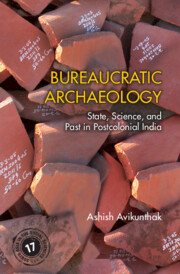
- Cited by 4
-
Cited byCrossref Citations
This Book has been cited by the following publications. This list is generated based on data provided by Crossref.
Jamir, Tiatoshi 2024. Decolonizing Archaeological Practice in Northeast India: Views from the Community Archaeology Initiatives in Nagaland. EAZ – Ethnographisch-Archaeologische Zeitschrift, Vol. 57, Issue. 1,
Troilo, Simona 2024. Ghosts between the lines: local workers in Italian archaeological excavations in Crete (1899–1910). European Review of History: Revue européenne d'histoire, Vol. 31, Issue. 6, p. 876.
Varghese, Rachel A 2024. Archaeology for the courtroom: the Ayodhya Case and the fashioning of a hybrid episteme. Journal of Social Archaeology, Vol. 24, Issue. 2, p. 109.
Kumar, Ashish 2025. Partition, Ownership of the Harappan Civilisation, Sibling Feud and National Identity Construction of India and Pakistan. South Asia Research, Vol. 45, Issue. 1, p. 88.
- Publisher:
- Cambridge University Press
- Online publication date:
- August 2021
- Print publication year:
- 2021
- Online ISBN:
- 9781009067119


